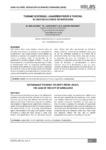Mostrar o rexistro simple do ítem
Turismo sostenible: lugareños frente a turistas: el caso de la ciudad de Barcelona
| dc.contributor.author | Abril-Sellarés, María | |
| dc.contributor.author | Azpelicueta Criado, María del Carmen | |
| dc.contributor.author | Sánchez-Fernández, María Dolores | |
| dc.date.accessioned | 2016-01-28T12:53:35Z | |
| dc.date.available | 2016-01-28T12:53:35Z | |
| dc.date.issued | 2015 | |
| dc.identifier.citation | Sellares, M., Azpelicueta, M., & Sánchez-Fernandez, M.D. (2015). TURISMO SOSTENIBLE: LUGAREÑOS FRENTE A TURISTAS. EL CASO DE LA CIUDAD DE BARCELONA. HOLOS, 3, 331-337. doi:http://dx.doi.org/10.15628/holos.2015.2809 | es_ES |
| dc.identifier.issn | 1807-1600 | |
| dc.identifier.uri | http://hdl.handle.net/2183/15944 | |
| dc.description.abstract | [Resumen] Este trabajo tiene como objetivo conocer cómo ha afectado el incremento de turistas y sus actividades en su estancia en una ciudad concreta y cómo afectan sus actitudes y acciones a los lugareños de dicha zona. Así mismo se pretende tratar la problemática de los apartamentos turísticos ilegales creados a raíz de una fuerte demanda y las primeras respuestas que ha dado la administración ante las constantes manifestaciones de rechazo de los vecinos de la zona a tratar. La tipología de turismo en la que se centra este estudio es el llamado turismo de masas y concretamente en el turismo de sol y playa y de borrachera, que ha alcanzado altas cotas en estos últimos diez años (Ajuntament de Barcelona 2014), donde los criterios de sostenibilidad parece que no son los principios rectores en la práctica de la actividad turística. Por tanto, hemos visto, por un lado, la necesidad de tratar los conceptos de turismo sostenible y la aplicación que se dan en un caso real: la ciudad de Barcelona y concretamente un barrio marinero como es la Barceloneta y, por otro lado, conocer qué efectos tanto sociales como económicos ha tenido en esta área geográfica concreta la práctica de este turismo. | es_ES |
| dc.description.abstract | [Abstract] This work aims to develop know how it has affected the increase in tourists and their activities in its stays in a particular city and how they affected their attitudes and actions to the locals of the area. It also aims to address the problem of illegal tourist apartments created as a result of strong demand and the first answers given by the administration at the continuing demonstrations against the residents of the area to be treated. The type of tourism in which this study focuses is called mass tourism and specifically to the sun and beach tourism and drunkenness, which has reached new heights in the last ten years (Ajuntament de Barcelona, 2014), where sustainability criteria seem to be no guiding principles in the practice of tourism. Therefore, we have seen, at first, the need to address the concepts of sustainable tourism and the application that occur in a real case: the city of Barcelona and specifically a seaside neighborhood as Barceloneta and, moreover, meet how much social and economic effects this has had on specific geographical area where is practicing this tourism. | es_ES |
| dc.language.iso | spa | es_ES |
| dc.relation.uri | http://www2.ifrn.edu.br/ojs/index.php/HOLOS/article/view/2809 | es_ES |
| dc.subject | Turismo sostenible | es_ES |
| dc.subject | Barcelona | es_ES |
| dc.subject | Turistas | es_ES |
| dc.subject | Lugareños | es_ES |
| dc.subject | Inadaptabilidad | es_ES |
| dc.subject | Sustainable tourism | es_ES |
| dc.subject | Tourists | es_ES |
| dc.subject | Local people | es_ES |
| dc.subject | Inadaptability | es_ES |
| dc.title | Turismo sostenible: lugareños frente a turistas: el caso de la ciudad de Barcelona | es_ES |
| dc.type | info:eu-repo/semantics/article | es_ES |
| dc.rights.access | info:eu-repo/semantics/openAccess | es_ES |
Ficheiros no ítem
Este ítem aparece na(s) seguinte(s) colección(s)
-
GI-GREFIN - Artigos [71]






